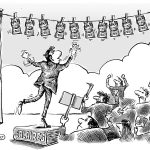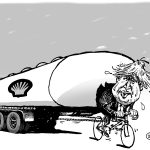A reunion
Will the Biden-Putin meeting just outline dissensions or make baby steps to a rapprochement?
A meeting of American and Russian heads of state in Geneva feels a bit like a Cold War summit, which, does not bode too well. As a matter for individuals or as a matter for States, the agendas seem too far apart and the grievances too numerous to be overcome. Observers and markets alike expect little progress from the 16 June summit. This is a far cry from the thaw of Perestroika, which was opened by the meeting between Ronald Reagan and Mikhail Gorbachev in November 1985 in the same city. That year, despite misunderstandings and mistrust, the first steps came from the East. It does not seem that it will be the same this time.
President Biden’s visit to Europe marked America’s friendly return to its allies, starting with the United Kingdom, then the G7 and NATO. This trip was meant to patch up and strengthen the transatlantic Alliance, both economic and strategic, but even more so with the aim of bringing together under the American wing the democracies to form a common front against China. The joint communiqué press release is a perfect reflection of this attempt. A true manifesto of global warming among the partners present – extended to South Korea, India and South Africa, invited – it details the commitments made in terms of international aid and multilateral cooperation as principles and values reaffirmed and defended, thus designating his opponents.
Russia is more tempted to play the economic card of “dedollarization” and the strengthening of its assets in gold and yuan, a further step towards Beijing.
When Joe Biden reaches Geneva, it will be with specific requests, but apparently few offers. Even in diplomatic terms, the formulas in the G7 communiqué press release sound harsh: Russia is urged to “cease its destabilizing undertakings and harmful activities”, denounced for having directly or indirectly “interfered in the internal affairs of democracies” and called upon to “fulfil its obligations and commitments in the field of human rights”. Designated as the protector if not the instigator of multiple cyberattacks, Russia is called to order. In the last few days alone, while the FBI announced that it had recovered part of the $4.4 million ransom paid by the oil company Colonial Pipeline, the global meat giant JBS admitted to having paid $11 million in ransom to hackers. By maintaining its positions in the Ukrainian conflict as well as on Crimea, the G7 does not seem to offer a way of negotiation between the two parties.
By all accounts, Joe Biden and Vladimir Putin do not know each other very well, and appreciate each other even less. Their attitude reflects agendas that are too far apart, all the more irreconcilable given that the two countries direct trade interests are distant, and their trade relations is minimal. The US accounts for only 3.2% of Russian exports. Penalized by the tariffs imposed by the Trump Administration, Russia is increasingly turning to Asia and especially China, which accounts for more than 14% of its exports and more than 23% of its imports in 20201. For its part, while the European Union remains Russia’s main customer and supplier, its share is decreasing every year.
Thus, faced with the threat of new sanctions, Russia is more tempted to play the economic card of “dedollarization” and the strengthening of its assets in gold and yuan, a further step towards Beijing. In short, Russia is eyeing the East, out of interest as much as out of affinity. Yet this does not seem without risk. The Siberian “soft belly” sparsely populated and rich in its underground, offers itself to an increasingly bolder China. In other times, the great Soviet-Chinese friendship had been shattered2. That does not make America any more attractive. For its part, it cannot completely renounce dialogue, or even the temptation to bring Russia back to post-Cold War understanding. Europe would not necessarily be opposed to this. Moreover, on the eve of the Iranian presidential election, which could strengthen the hard-line faction of the “Revolutionary Guards”, can the United States, which is struggling to relaunch the nuclear dialogue, do without any dialogue with Russia, which is increasingly present in the region?
In the meetings at the top of the post-Covid period, distancing will still be the rule.
1 According to a note from the French Directorate-General of the Treasury
2 In 1965 at the beginning of the Cultural Revolution
Original text in French published in Allnews.ch June 15th. ©Cartoon by Barret



